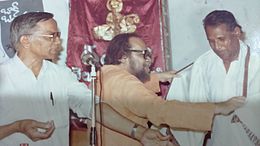Aarudhra
| Aarudhra | |
|---|---|
 |
|
| Born |
Bhagavatula Sadasiva Shankara Sastry 31 August 1925 Visakhapatnam, Andhra Pradesh, India |
| Died | 4 June 1998 |
| Residence | Chennai, Tamil Nadu, India |
| Occupation | poet, lyricist, songwriter, translator, and writer |
| Known for | Aarudhra shiva |
| Spouse(s) | K. Rama Lakshmi |
| Awards | Sahitya Akademi Award, 1987 |
Aarudhra (born Bhagavatula Sadasiva Shankara Sastry) (31 August 1925 – 4 June 1998), was an Indian author, poet, lyricist, translator, publisher, dramatist, playwright, and an expert in Telugu literature. Aarudhra is the nephew of Telugu poet Sri Sri, and is also known for his works exclusively in Telugu cinema as a screenwriter, dialogue writer, and story writer, and is the recipient of the Sahitya Akademi Award in 1987.
Aarudra was born in Visakhapatnam, Andhra Pradesh, India on 31 August 1925. After the primary education, he shifted to Vizianagaram in 1942 for his college education. He got attracted to Communism after coming into contact with people like Ronanki Appalaswami and Chaganti Somayajulu. He joined the Indian Air Force as a Band Boy in 1943 and served it till 1947. He shifted to Madras and worked as editor of Anandavani magazine for two years. Joining the cine field in 1949, he wrote lyrics and dialogues for many films. He married noted writer K. Rama Lakshmi (a columnist and a writer-critic in her own right) in 1954.
Tvamevaham (You are none other than me) and Samagra Andhra Sahityam (An Encyclopedia of Telugu Literature) are his landmark works. He wrote poetry such as Koonalamma Padaalu, reminiscences of the Second World War. He translated the Tamil treatise Tirukkural into Telugu. He belonged to the school of progressive writers such as Abhyudaya Rachayitala Sangham.
Tvamevaaham written in 1948 was based on the contemporary violence and lawlessness during the Razakar movement in the princely state of Hyderabad. The Razakar attrocoties were sponsored by the Nizam against his own people who wanted to overthrow him in favor of democracy and join the Indian Union. In this kaavyam, death spoke to a human being and says, "you and I are the same (Tvamevaaham)".
...
Wikipedia
